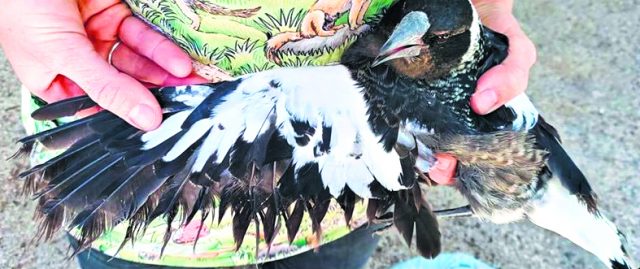
Local wildlife rehabilitation community members are concerned about the amount of
birds being deliberately and illegally kept as pets this year, with many of them presenting physical signs of malnutrition.
This year dozens of birds being surrendered to Darling Range Wildlife Shelter in Martin are presenting with chronic malnutrition, broken/deformed feathers, poor bone density and
problematic social or human teenagerhood.
Between 2019 and 2020, 108 magpies were admitted to the shelter with one in four of those presenting physical signs of malnutrition.
Wildlife liaison and support manager Yasmin Hunter said the birds also present extremely poor magpie social skills, requiring weeks of careful management to get them accepted
by other magpies.
“One adult male magpie was kept in someone’s shower room for over a year, without enrichment or insects, or even natural branches to perch on,” she said.
“Needless to say, he was in all kinds of strife on arrival with calluses from perching on metal shower curtain rods, signs of malnutrition, overgrown beak and nails, extreme human aggression.
“We’ve had multiple young magpies admitted from Roleystone over the past few months who were very humanised, had broken tail and wing feathers due to malnutrition, and some even with pink nail polish on their legs on admission.
“We have many difficult cases where well-meaning people have ended up denying magpies a chance at being healthy and wild.
“But thankfully, we have had many, many more cases where people have found injured or
young magpies and taken them directly to the shelter or a vet hospital for assessment.”
The most recent case involved an immature magpie found seeking refuge in someone’s
yard.
The bird was a part of a flock in Victoria Park where a large population of magpies congregated around a couple of residential properties multiple times a day to take free handouts of minced meat.

Ms Hunter said the parents of the magpie were attacking her as they are commonly known for being extremely territorial and she was unable to fly away because of her chronic malnutrition.
“This magpie wasn’t confined in an enclosure like some of our other malnutrition magpies, but she was confined to an unsafe property due to the malnutrition caused by well-meaning people feeding wildlife,” she said.
“For magpies like her who have severe feather malnutrition, we might be waiting a year or more before the feathers moult out and regrow strong enough for a successful release.
“For all the people who decide to be a part of the solution, but handing unwell wildlife to wildlife centres rather than feeding wildlife or keeping them illegally as pets, we applaud you and I’m sure the magpies would agree, you wildlife heroes are life savers.
“If anyone is wanting to attract wildlife to their homes, oh that’s just wonderful, we are all about helping wildlife flourish while also nurturing positive wildlife-human experiences.
As professional wildlife rehabilitators, we hope people can listen to our advice and help keep wildlife healthy by providing healthy food sources – such as a healthy and diverse garden, composting, attracting invertebrates, keeping a worm farm, mulching the gardens to provide a food magpie foraging area, nurturing large native trees the magpies rely on for roosting, resting and nesting.
“But we do ask people to please not feed wildlife.”
If you have any questions, or have seen a magpie you are concerned
about, call the volunteers on 93940885 or email support@darlingrangewildlife.com.au













